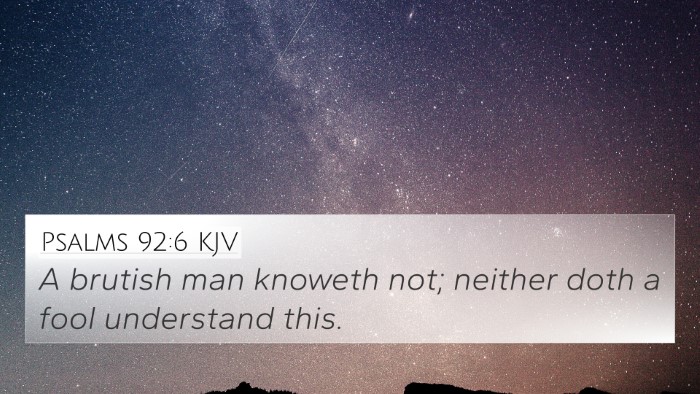Understanding Proverbs 12:1
Proverbs 12:1 states, "Whoever loves discipline loves knowledge, but whoever hates correction is stupid." This verse serves as a foundational truth about the value of instruction and the pursuit of wisdom.
Key Themes
- Value of Discipline: The verse emphasizes the importance of discipline as a means to gain knowledge. This concept is mirrored in various other scriptures that promote guidance and correction as pathways to enlightenment.
- Attitude Towards Correction: The negative attitude towards correction is described in stark terms, illustrating the foolishness of rejecting wise counsel.
- Wisdom and Knowledge: There is a strong connection drawn between the acceptance of correction and the acquisition of wisdom.
Cross-References
In studying Proverbs 12:1, several other Bible verses can be referenced for deeper understanding:
- Proverbs 3:11-12: "My son, do not despise the Lord’s discipline, and do not resent his rebuke, because the Lord disciplines those he loves, as a father the son he delights in."
- Hebrews 12:11: "No discipline seems pleasant at the time, but painful. Later on, however, it produces a harvest of righteousness and peace for those who have been trained by it."
- Proverbs 1:7: "The fear of the Lord is the beginning of knowledge, but fools despise wisdom and instruction."
- Proverbs 9:8: "Rebuke the wise and they will love you. Teach the righteous and they will add to their learning."
- Job 5:17: "Blessed is the one whom God corrects; so do not despise the discipline of the Almighty."
- Psalms 94:12: "Blessed is the one you discipline, Lord, the one you teach from your law."
- Proverbs 15:32: "Those who disregard discipline despise themselves, but the one who heeds correction gains understanding."
Insights from Public Domain Commentaries
This verse has been expounded upon by several public domain commentaries:
- Matthew Henry: Henry emphasizes the necessity of love for discipline in acquiring wisdom. He identifies the two paths of the wise and the foolish, explaining how one's response to correction defines their character.
- Albert Barnes: Barnes highlights the contrast between acceptance and rejection of correction, stating that the wise person accepts discipline as a loving means of improvement, while the foolish person despises it leading to their own ruin.
- Adam Clarke: Clarke discusses the implications of the verse in the context of spiritual growth, underscoring that to embrace discipline is to open oneself to the deeper truths of God and to the development of a righteous character.
Thematic Connections
Understanding Proverbs 12:1 alongside related verses paints a broader picture of the role of discipline and correction in a believer's life:
- Theme of Wisdom: The inter-Biblical dialogue on wisdom, found in books like Ecclesiastes and the epistles, showcases the importance of humility and teachability.
- Instruction and Growth: The emphasis on correction as a tool for growth resonates through both the Old and New Testaments, linking to the teachings of Jesus on humility and servant leadership.
Application of Cross-Referencing
Cross-referencing helps readers understand the connections between different biblical texts. Engaging with a Bible concordance or a Bible cross-reference guide allows for a deeper exploration of themes such as:
- How discipline is framed in both Testaments.
- The comparative analysis of wise and foolish behavior throughout scripture.
- The role of correction in spiritual maturity.
For those seeking to uncover further cross-references or to delve deeper into the theological implications of Proverbs 12:1, tools for Bible cross-referencing such as a bible cross-reference system can be invaluable. Understanding such connections can transform one’s study and application of biblical principles.
Conclusion
Proverbs 12:1 is rich with meaning and application, encouraging believers to embrace discipline and correction as crucial elements of their spiritual journey. By utilizing various cross-referencing methods and exploring the insights of public domain commentaries, one can gain a comprehensive understanding of this verse and its interconnections within the broader biblical narrative.















